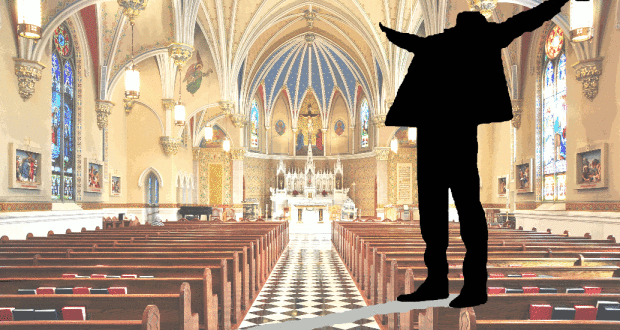Pros: Eloquent and insightful writing performed with an endearing empathy.
Cons: Slightly repetitive writing at times during Angel; for instance the priest’s struggle was depicted with verbal dexterity, but reiterated too often. An intense but enjoyable evening well suited to The London Theatre's intimate environment.
Summary
Rating
Good
I have often struggled to enjoy one-man plays. To me, it seemed like creating a story around two or more characters but having only one of them speaking and visible was fruitless. Why not just up the ante and have more people on stage? Far more exciting. I was convinced that trekking to the (gorgeous) London Theatre in New Cross would add insult to injury. However Angel and We are Pope – two one-man plays written by Martin Foreman – proved exactly why one-man plays retain their place in the dramatic repertoire. Both pieces focus so intensely on the personal struggles of their respective protagonists that to have had any more characters on the stage could only have been a distraction.
A fierce battle between faith and earthly desires forms the core of both plays. In Angel, Christopher Peacock (a former ITV reporter) plays a priest speaking to Michael, his employed lover, of the inner turmoil his love of the angelically named character causes him. He finds himself constantly torn between “the promise of ecstasy tomorrow or the fulfilment of ecstasy today”.
Peacock plays a gently spoken priest with effectively fluctuating dynamics throughout. The occasional slip into a slightly forced sounding inflection took little away from the conflicting emotions surging through the piece. As the priest drinks more and more wine, his revelations deepen on a personal and philosophical level. Peacock depicts the increasing hold of the wine on his mind with subtly deft skill. His body language opens, gestures become exaggerated, and his speech begins to tumble over itself before he reigns himself in in the final moments of the play, leaving the stage with a dignified “perhaps the battle is already lost”.
Now we are Pope focuses on the London born writer and eccentric Frederick Rolfe, who was renowned for his inability to get along with the people who tried to support him and his tenuous career. In Foreman’s work he recounts tales of the numerous enemies he’s gathered throughout his life.
Christopher Annus portrays Rolfe with an effective characterisation of the sometimes endearing, mostly frustrating, bumbling man. His constant rolling up and fumbling with cigarettes never to be smoked represents a man unable to see anything through to the end; reflecting Annus’s entertaining accounts full of blame for the people who “prevented” his success in life.
Beneath the anger and frustration of the character, Annus gives his audiences glimpses of an intense vulnerability. His outwardly irate calls to Rolfe’s young manservant betray a fear of abandonment and solitude which juxtaposes the frustrated ranting just enough to make it convincing.
Both Peacock and Annus give insightful performances as their homosexual characters torn between faith and bodily desires. Minimal sets with bare walls, but for a framed biblical picture, reflect the simple effectiveness of the one-man plays themselves. The direction encompassed enough movement so that the material avoids becoming static, but not so much that it distracts from the words that carry the audience into the turbulent and troubled minds of Foreman’s wonderfully believable characters. It’s not an evening of easy viewing, but I came away with a pensive satisfaction that made the trip down to New Cross well worth it.
Author: Martin Foreman
Director: Martin Foreman
Producer: Arbery Productions
Box Office: 020 8694 1888
Booking Link: http://www.thelondontheatre.com/10.html
Booking Until: 23 March 2014
 Everything Theatre Reviews, interviews and news for theatre lovers, London and beyond
Everything Theatre Reviews, interviews and news for theatre lovers, London and beyond



